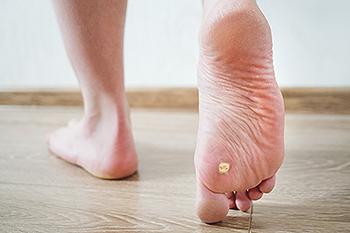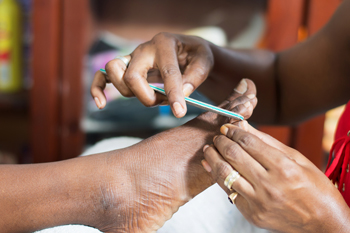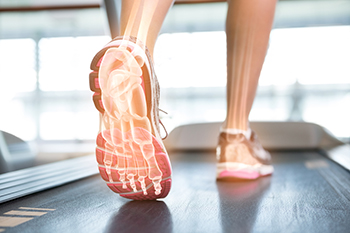Items filtered by date: August 2021
What Is a Gait Analysis?
A gait analysis is a method used to identify abnormalities in your walking or running pattern. This is a useful tool, especially for runners. Many people are afflicted with muscle imbalances, overpronated gaits, or other biomechanical issues that can make foot and ankle injuries more likely to occur while running. There are several types of gait analyses. An observational gait analysis involves a physical examination of your feet followed by a visual assessment of your gait. Following this, it should be easier to know what types of running shoes, orthotics, or other support you may need to correct any biomechanical problems. Other types of gait analyses may also measure force on your feet. To learn more about gait analyses, please consult with a podiatrist.
If you have any concerns about your feet, contact Dr. Tupper from Coshocton Foot Health Center. Our doctor can provide the care you need to keep you pain-free and on your feet.
Biomechanics in Podiatry
Podiatric biomechanics is a particular sector of specialty podiatry with licensed practitioners who are trained to diagnose and treat conditions affecting the foot, ankle and lower leg. Biomechanics deals with the forces that act against the body, causing an interference with the biological structures. It focuses on the movement of the ankle, the foot and the forces that interact with them.
A History of Biomechanics
- Biomechanics dates back to the BC era in Egypt where evidence of professional foot care has been recorded.
- In 1974, biomechanics gained a higher profile from the studies of Merton Root, who claimed that by changing or controlling the forces between the ankle and the foot, corrections or conditions could be implemented to gain strength and coordination in the area.
Modern technological improvements are based on past theories and therapeutic processes that provide a better understanding of podiatric concepts for biomechanics. Computers can provide accurate information about the forces and patterns of the feet and lower legs.
Understanding biomechanics of the feet can help improve and eliminate pain, stopping further stress to the foot.
If you have any questions please feel free to contact our office located in Coshocton, OH . We offer the newest diagnostic and treatment technologies for all your foot and ankle needs.
Understanding Warts on the Feet
 A verruca is a small wart on the sole of the foot. They are more commonly known as plantar warts. Plantar warts can grow on the sole of the foot because of the human papillomavirus (HPV). This virus is contagious and thrives in warm and moist environments like locker rooms and swimming pools which makes plantar warts common for people who are barefoot in these communal areas. Plantar warts are not usually painful unless they are bearing weight. Some patients have found they may be tender to the touch as well. To avoid the spread of plantar warts, you should wear flip flops in communal areas such as pools, locker rooms, or showers. If you have a plantar wart that persists, consulting with a podiatrist and getting professional advice can be extremely beneficial.
A verruca is a small wart on the sole of the foot. They are more commonly known as plantar warts. Plantar warts can grow on the sole of the foot because of the human papillomavirus (HPV). This virus is contagious and thrives in warm and moist environments like locker rooms and swimming pools which makes plantar warts common for people who are barefoot in these communal areas. Plantar warts are not usually painful unless they are bearing weight. Some patients have found they may be tender to the touch as well. To avoid the spread of plantar warts, you should wear flip flops in communal areas such as pools, locker rooms, or showers. If you have a plantar wart that persists, consulting with a podiatrist and getting professional advice can be extremely beneficial.
Plantar warts can be very uncomfortable. If you need your feet checked, contact Dr. Tupper from Coshocton Foot Health Center. Our doctor will assist you with all of your foot and ankle needs.
About Plantar Warts
Plantar warts are the result of HPV, or human papillomavirus, getting into open wounds on the feet. They are mostly found on the heels or balls of the feet.
While plantar warts are generally harmless, those experiencing excessive pain or those suffering from diabetes or a compromised immune system require immediate medical care. Plantar warts are easily diagnosed, usually through scraping off a bit of rough skin or by getting a biopsy.
Symptoms
- Lesions on the bottom of your feet, usually rough and grainy
- Hard or thick callused spots
- Wart seeds, which are small clotted blood vessels that look like little black spots
- Pain, discomfort, or tenderness of your feet when walking or standing
Treatment
- Freezing
- Electric tool removal
- Laser Treatment
- Topical Creams (prescription only)
- Over-the-counter medications
To help prevent developing plantar warts, avoid walking barefoot over abrasive surfaces that can cause cuts or wounds for HPV to get into. Avoiding direct contact with other warts, as well as not picking or rubbing existing warts, can help prevent the further spread of plantar warts. However, if you think you have developed plantar warts, speak to your podiatrist. He or she can diagnose the warts on your feet and recommend the appropriate treatment options.
If you have any questions please feel free to contact our office located in Coshocton, OH . We offer the newest diagnostic and treatment technologies for all your foot and ankle needs.
Helpful Tips for Maintaining the Health of Your Feet
 Many people take their feet for granted, despite their importance despite the fact they are the foundation of the body. There are simple techniques that can improve the overall health of your feet which will have a positive effect on the rest of your body. These helpful tips can include washing and drying the feet thoroughly every day, followed by applying a good moisturizer. When the toes are trimmed properly, painful foot conditions such as ingrown toenails may be prevented. Maintaining a hygiene routine for your feet may play a significant role in preventing athlete's foot, which can make the feet feel itchy and uncomfortable. If you would like additional information about the importance of practicing everyday foot care techniques, it is suggested that you consult with a podiatrist.
Many people take their feet for granted, despite their importance despite the fact they are the foundation of the body. There are simple techniques that can improve the overall health of your feet which will have a positive effect on the rest of your body. These helpful tips can include washing and drying the feet thoroughly every day, followed by applying a good moisturizer. When the toes are trimmed properly, painful foot conditions such as ingrown toenails may be prevented. Maintaining a hygiene routine for your feet may play a significant role in preventing athlete's foot, which can make the feet feel itchy and uncomfortable. If you would like additional information about the importance of practicing everyday foot care techniques, it is suggested that you consult with a podiatrist.
Everyday foot care is very important to prevent infection and other foot ailments. If you need your feet checked, contact Dr. Tupper from Coshocton Foot Health Center. Our doctor can provide the care you need to keep you pain-free and on your feet.
Everyday Foot Care
Often, people take care of their bodies, face and hair more so than they do for their feet. But the feet are a very important aspect of our bodies, and one that we should pay more attention to. Without our feet, we would not be able to perform most daily tasks.
It is best to check your feet regularly to make sure there are no new bruises or cuts that you may not have noticed before. For dry feet, moisturizer can easily be a remedy and can be applied as often as necessary to the affected areas. Wearing shoes that fit well can also help you maintain good foot health, as well as making it easier to walk and do daily activities without the stress or pain of ill-fitting shoes, high heels, or even flip flops. Wearing clean socks with closed shoes is important to ensure that sweat and bacteria do not accumulate within the shoe. Clean socks help to prevent Athlete’s foot, fungi problems, bad odors, and can absorb sweat.
If you have any questions please feel free to contact our office located in Coshocton, OH . We offer the newest diagnostic and treatment technologies for all your foot and ankle needs.
Can Falling Be Prevented?
 Falling is a major cause of hospital stays for people who are age sixty-five and older. They can encounter serious foot conditions, and can make accomplishing daily activities difficult to achieve. Additionally, a fear of falling may invoke a loss of independence, following spending several days in the hospital. The group of people who are at risk can include patients who wear shoes that do not fit correctly, have a vitamin D deficiency, or who have mobility and balance issues. It is beneficial to repair hazardous conditions in the household, which can consist of removing worn rugs, and installing grab bars in the shower and toilet area. It can help to maintain regular physical examinations that can monitor vision and blood pressure. If you would like more information about how to protect the feet and prevent falling, please consult with a podiatrist.
Falling is a major cause of hospital stays for people who are age sixty-five and older. They can encounter serious foot conditions, and can make accomplishing daily activities difficult to achieve. Additionally, a fear of falling may invoke a loss of independence, following spending several days in the hospital. The group of people who are at risk can include patients who wear shoes that do not fit correctly, have a vitamin D deficiency, or who have mobility and balance issues. It is beneficial to repair hazardous conditions in the household, which can consist of removing worn rugs, and installing grab bars in the shower and toilet area. It can help to maintain regular physical examinations that can monitor vision and blood pressure. If you would like more information about how to protect the feet and prevent falling, please consult with a podiatrist.
Preventing falls among the elderly is very important. If you are older and have fallen or fear that you are prone to falling, consult with Dr. Tupper from Coshocton Foot Health Center. Our doctor will assess your condition and provide you with quality advice and care.
Every 11 seconds, an elderly American is being treated in an emergency room for a fall related injury. Falls are the leading cause of head and hip injuries for those 65 and older. Due to decreases in strength, balance, senses, and lack of awareness, elderly persons are very susceptible to falling. Thankfully, there are a number of things older persons can do to prevent falls.
How to Prevent Falls
Some effective methods that older persons can do to prevent falls include:
- Enrolling in strength and balance exercise program to increase balance and strength
- Periodically having your sight and hearing checked
- Discuss any medications you have with a doctor to see if it increases the risk of falling
- Clearing the house of falling hazards and installing devices like grab bars and railings
- Utilizing a walker or cane
- Wearing shoes that provide good support and cushioning
- Talking to family members about falling and increasing awareness
Falling can be a traumatic and embarrassing experience for elderly persons; this can make them less willing to leave the house, and less willing to talk to someone about their fears of falling. Doing such things, however, will increase the likelihood of tripping or losing one’s balance. Knowing the causes of falling and how to prevent them is the best way to mitigate the risk of serious injury.
If you have any questions, please feel free to contact our office located in Coshocton, OH . We offer the newest diagnostic and treatment technologies for all your foot care needs.
Ingrown Toenail Treatments
Ingrown toenails are an annoying but typically mild problem that occurs when the corner or edge of a toenail grows into the surrounding skin, rather than over it. This can cause the skin to become red, swollen, tender, or painful. Ingrown toenails can often be managed with home treatment and footwear modifications. Over the counter anti-inflammatory medications can reduce pain and swelling. Sometimes an ingrown toenail can result in an infection. Your podiatrist can prescribe antibiotics if this occurs. When it comes to the ingrown toenail itself, your podiatrist may remove the ingrown part of the nail through a procedure called partial nail avulsion. To prevent ingrown toenails, it is suggested that you trim your toenails straight across and not too short using nail clippers, and that you wear shoes that are not too tight in the toes. For more information about ingrown toenails, please consult with a podiatrist.
Ingrown toenails may initially present themselves as a minor discomfort, but they may progress into an infection in the skin without proper treatment. For more information about ingrown toenails, contact Dr. Tupper of Coshocton Foot Health Center. Our doctor can provide the care you need to keep you pain-free and on your feet.
Ingrown Toenails
Ingrown toenails are caused when the corner or side of a toenail grows into the soft flesh surrounding it. They often result in redness, swelling, pain, and in some cases, infection. This condition typically affects the big toe and may recur if it is not treated properly.
Causes
- Improper toenail trimming
- Genetics
- Improper shoe fitting
- Injury from pedicures or nail picking
- Abnormal gait
- Poor hygiene
You are more likely to develop an ingrown toenail if you are obese, have diabetes, arthritis, or have any fungal infection in your nails. Additionally, people who have foot or toe deformities are at a higher risk of developing an ingrown toenail.
Symptoms
Some symptoms of ingrown toenails are redness, swelling, and pain. In rare cases, there may be a yellowish drainage coming from the nail.
Treatment
Ignoring an ingrown toenail can have serious complications. Infections of the nail border can progress to a deeper soft-tissue infection, which can then turn into a bone infection. You should always speak with your podiatrist if you suspect you have an ingrown toenail, especially if you have diabetes or poor circulation.
If you have any questions, please feel free to contact our office located in Coshocton, OH . We offer the newest diagnostic and treatment technologies for all your foot care needs.




